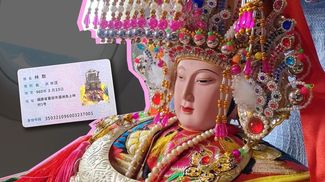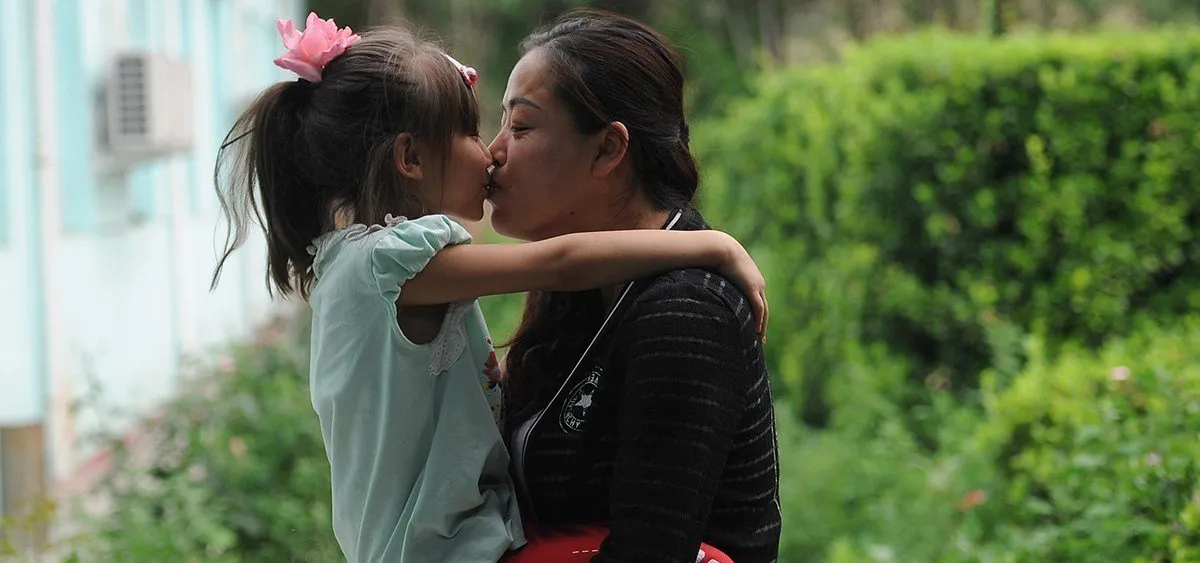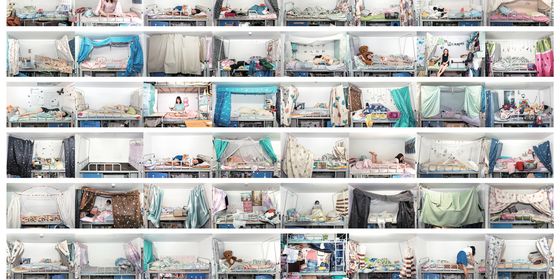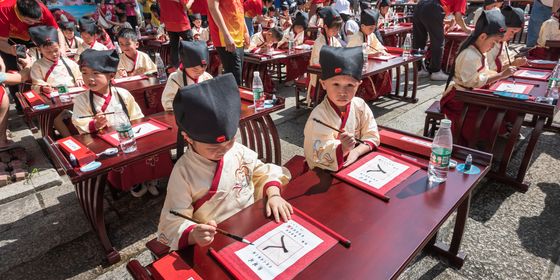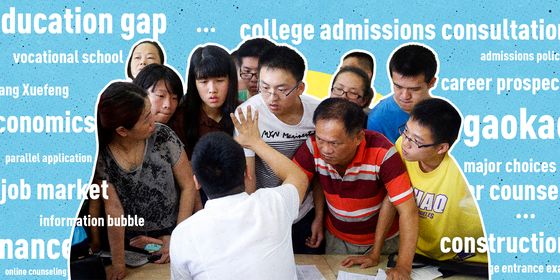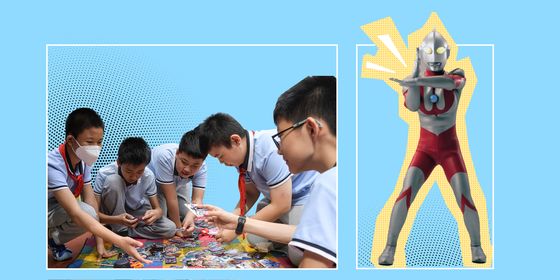Children with HIV in China face widespread discrimination, but one school aims to help
The Linfen Red Ribbon School offers an education and a home to children and teenagers with HIV, the only one of its kind in China. Guo Xiaoping, a former hospital director, started the project in 2004 by setting up a classroom in an empty ward of Linfen Third People’s Hospital after meeting a group of children infected with HIV who were unable to attend school. The boarding school was officially opened in 2011. Over the past 12 years, the school has grown to a size of around 40 students and seven members of staff, with the first high school class recently graduating.
Education, living costs, and medical expenses are all free for students, funded by both the government and individual donations. It teaches classes from first through to 12th grade after receiving approval in 2011 from the local education authority to provide compulsory education.
Guo Xiaoping, now the principal of the Red Ribbon School, was quoted in the China Daily as saying, “without us, these children might not have even had the chance to go to school.
“Because, apart from their physical pain, they have suffered more from psychological pressure caused by social stigma and discrimination,” Guo said.
State news agency Xinhua reported that there were approximately 654,000 people living with HIV in China as of September 2016, accounting for less than 1 percent of the population. Although the WHO representative in China, Bernhard Schwartlander, said “transmission rates from HIV-positive mothers to their babies fell from 35 percent in 2009 to 7 percent in 2012,” China’s National Center for AIDS/STD Control and Prevention suggested over 800,000 are living undiagnosed. Despite the government’s increased spending on testing and provision of free treatment, efforts to treat and prevent the disease are still hampered by the stigma attached to HIV in China.
Linfen Red Ribbon School has been the subject of a documentary called Children of the Harbor, a project conceived by a medical student who lived at the school during an internship in 2012. The team of filmmakers have followed 4 students since 2015, visiting the school at least once or twice every year, spending at least a week each time with the children.
This year is an important year for the team. Ann Wang, co-founder of the project, told TWOC: “The first generation of the students will be graduating and doing their gaokao in 2017. It will be a big test on how the school can handle these students and also a big life transition for some of the kids that have lived at the school for more than 10 years.”
But she said “the stigma is very very bad. For example, I was visiting an university in Linfen and interacting with some female university students who volunteer at the Red Ribbon school. We were having a discussion about the future for the students at the Red Ribbon School, and 8 out of 10 of the female students that I was talking to think that HIV students should have their own separate dorm room.”
According to Ann, the four children in the documentary have changed dramatically since the start of filming. “The year before graduating, some kids have really negative thoughts about the school, they hate being there, the hate the idea of a red ribbon school. But their thoughts changed in the year heading to gaokao. They begin to realize how lucky they are being able to be here, to study to do the things they like, to live a zero discrimination life (within the school).”
The Beijing Gender Health Education Institute (BGHEI) is also tackling the stigma against HIV. It was one of the first NGOs in China to try and end discrimination and this year they are celebrating their 20th anniversary. TWOC spoke to Martin G. Yang, the NGO’s Sustainable Development Project Manager, about the challenges faced by those with HIV. “The government pays for cures and treatment, but they don’t want to pay for prevention,” he said, “so we try to reduce discrimination through education, public activities, and advocacy.”
“For HIV adults who need to go to the hospital if they have a bone fracture or need an operation, or if it involves blood, they will always be refused,” Yang explains. “HIV is still considered contagious. The government has appointed a few hospitals to be designated hospitals to treat people with HIV but they are creating another sense of segregation.”
But for the children at the Red Ribbon School, Ann told TWOC that “medication is no longer a challenge, most HIV children and adults live a very healthy life. But the main challenge is still finding jobs and a partner.”
This year BGHEI are raising money to produce and promote information channels on multimedia for people to learn about HIV. “We want neutral and correct information on sites like Baidu—there is a lot of strange information on there and people get afraid when they look up information,” Yang said. “When people want to learn about HIV they can usually only find limited information.”
Regarding the Red Ribbon School and discrimination, Yang said “I hope in the long run there won’t be any segregated schools for children with HIV, but I understand why the school was formed.”
When asked about the segregation of children from society, Ann said “my thoughts on the school have been shifting throughout the years, at first I was very against the idea of having a separated school for these kids, and I’m still against the idea of it.
“But as I keep filming and have the opportunity to visit some of the student’s family in their hometown, some have no parents, some only have a father, some have no running water or food at home. I begin to understand that, without this school, some kids would have died years ago.”
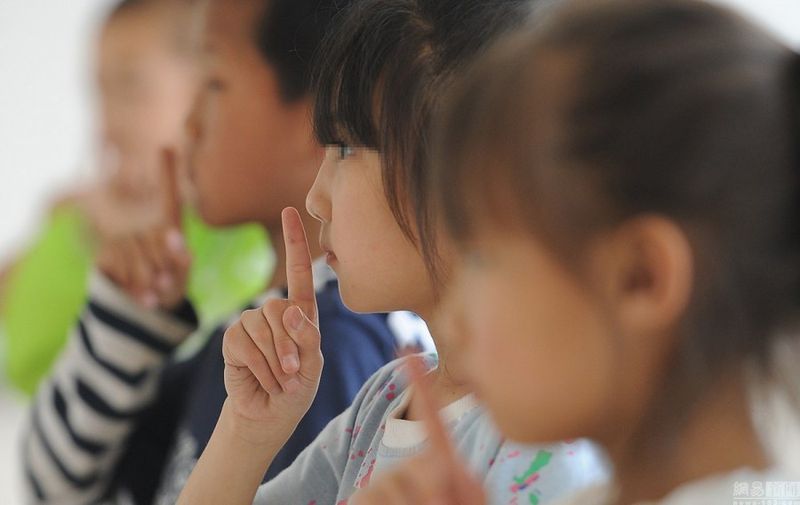
Principal Guo says that most of the kids are orphans, and that many don’t even know their real names or what it’s like to have a mother. In the picture, they learn how to sign “mom.” (Shanghaiist)
Yang added: “In another way, it will create more problems. For example, children who go to the school feel they can only socialize with people like them. So it’s segregating them from other parts of society. Maybe they think they can only date or be friends with people living with HIV.”
Although volunteers frequently help at the school, these people do not represent society, but unfortunately these are the people that children get to interact with the most, Ann explained to TWOC.
Criticism also arose from the decision to isolate the Red Ribbon School students while they took the gaokao exam. According to Sixth Tone, the Director of the Zhitong Guangzhou LGBT Center said that educating kids with HIV separately “gives the public the negative impression that these people should be isolated.”
Guo, principal of the Red Ribbon School, rejects this idea: “I hope, as they do, that one day, when there is no discrimination against people living with HIV/AIDS, there will be no need for our school to exist,” he said. “But until then, I will continue my work, raising people’s awareness about an inclusive environment for people with HIV/AIDS.”
Ann said that end goal for the Children of the Harbor project is to “make sure we make a good edit with the footage we got from the Red Ribbon, we want to tell a balanced but telling story, we want to make sure to showcase the true personality of each kids, their struggles and their happiness.
“The next step for the kids is to go to university or vocational schools. The school wants to make sure they continue their students in order to find a job so they can live on their own or support their family in the future.”
The Children of the Harbor documentary is expected to be released towards the end of next year.
Images from Shanghaiist

